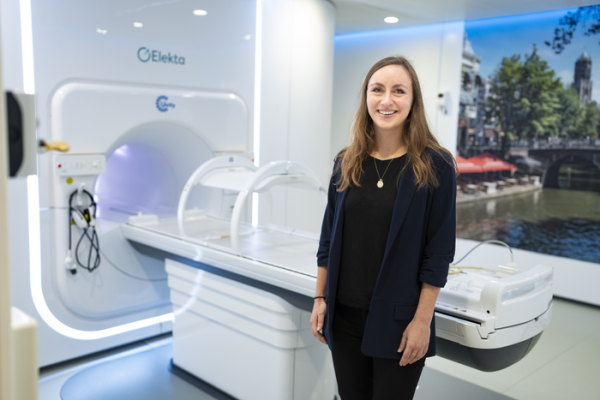
Researcher Lois Damen at the MR Linac in the University Medical Center Utrecht (UMC Utrecht). Image courtesy of UMC Utrecht/Ivar Pel
June 5, 2023 — UMC Utrecht researchers in the Netherlands are starting two new projects to treat cancer with image-guided interventions. For one research project, they are using MRI-guided radiotherapy, for the other ultrasound techniques. Their projects are made possible by KWF Dutch Cancer Society, which has granted them almost 1.5 million euros in total.
The research with the MR-Linac and other MRI-guided radiotherapy is aimed at locally advanced pancreatic cancer. The MR-Linac was invented by UMC Utrecht and has been used in daily clinical practice since 2018. It uses MRI images to adapt the radiation field to the precise location of the tumor and the surrounding healthy tissue and organs. As a result, tumors can be attacked with higher precision, even when they are moving a lot, due to breathing or peristaltic movements. This not only makes the radiotherapy more effective but also results in a less demanding treatment for the patients. The high precision of the MRI-guided therapy ensures that surrounding healthy tissue is less affected. And the machine makes it safer to administer a higher daily or total dose of radiation. Result: patients don’t have to visit hospital as often as before. MR-guided therapy has been applauded worldwide and is now being used in many more healthcare centers, both in the Netherlands and abroad, to treat different types of cancer.
KWF Cancer Society has awarded this research with almost one million euros. Researcher Lois Daamen: “We hope to prove that MRI-guided radiotherapy can indeed help LAPC-patients to survive and/or have a better quality of life, improving the daily healthcare for this group of patients all over the world.”
Pancreatic cancer is one of the most fatal types of cancer: only 4 percent of patients will have survived after 10 years. Unfortunately, the illness is often detected rather late: 40 percent of patients have already developed locally advanced pancreatic cancer (LAPC) when they are being diagnosed. This means that their tumors have grown into the surrounding blood vessels. Then, patients will initially not be operated upon but will first receive chemotherapy. This way, the tumor will hopefully get smaller, preventing metastases or making surgery a possibility after all. Unfortunately, after chemotherapy, LAPC-patients will, on average, still only survive for 15 months. In the new research, Daamen will now try to find out how LAPC patients’ chances of survival and life quality will improve when MRI-guided radiotherapy is added to chemotherapy. She does so within the LAPSTAR trial, for which she cooperates with a group of specialized radiotherapists from UMC Utrecht, Amsterdam UMC, Radboud UMC and Catharina Hospital, the Dutch Pancreatic Cancer Group and the Centre for Human Drug Research. Hopefully, the higher radiation dose combined with chemotherapy will slow down tumor growth.
Ultrasound Against Head and Neck Cancers
The other new research also involves an image-guided, minimally invasive cancer treatment. That is, it makes use of ultrasound to help fight head and neck cancers. Every year, approximately 3,000 Dutch people are diagnosed with a type of head and neck cancer. Unfortunately, with 60 percent of them, the disease has already advanced locally. They will have to undergo intense treatment, often consisting of several components, such as surgery, radiotherapy and/or chemotherapy.
Chemotherapy and radiation are most effective in well circulated, oxygenated tumors. Then, medicines will penetrate the tumor better, and oxygen enhances the effect of radiation. Unfortunately, tumor blood vessels are often fragile and hard to control. Result: the blood flow is obstructed, reducing the effect of the treatments.
Researcher Roel Deckers will now try to solve this problem with the help of ultrasound. Ultrasound is a very familiar technology in healthcare. It is, for instance, used with pregnant women to make images of the fetus with high-frequency sound waves, which cannot be heard by humans. Decker, however, is applying the technology in a very different, innovative way: he’s injecting gas-filled microbubbles in a patient’s bloodstream and makes them vibrate with ultrasound in tumor blood vessels. This way, he hopes to improve the blood flow in the tumor, increasing the efficacy of chemo- and radiotherapy.
KWF Dutch Cancer Society has granted Deckers almost half a million euros for his research. “Increasing the efficacy of medicines, that’s what I am aiming for. Now, it’s up to me to show that ultrasound may play a key role in this”, Deckerssays


 February 13, 2026
February 13, 2026 









